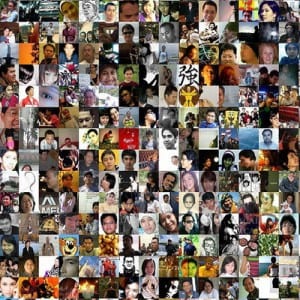What has Facebook done to us?
By Robert Eagle, on 30 January 2012
 “My mum just added me on Facebook,” I said in horror last month. Those are the words we all dread uttering.
“My mum just added me on Facebook,” I said in horror last month. Those are the words we all dread uttering.
These words were also the main focus of the Lunch Hour Lecture, ‘What has Facebook done to us?’ by Professor Daniel Miller (UCL Anthropology), on 19 January.
Miller has been studying the impact of Facebook on individuals, relationships and communities. Social anthropology has always been the study of social networks – how people relate to each other, traditionally in the context of kinship. Now, Miller and others in the field of digital anthropology are examining how Facebook can both help forge closer relationship for those separated by distance and, conversely, create tensions within close-knit communities.
There is a Euro-American fear that the internet is fostering greater individualism and disjuncture in society. Miller argues that Facebook: 1) bucks this trend, as by its very nature it connects people, and 2) is used differently by each community. There are, for example, uniquely British, Filipino or Caribbean ways of using Facebook, which shape our relationship to others.
In one of Miller’s case studies of the Filipino diaspora, Facebook has been a tool for connecting female domestic helpers in London with their children in the Philippines.
The use of Facebook changes how those women now view their roles as mothers, just as it shapes the way these children view their mothers, whom they may not have seen in several years. Posting of photos is a way for the London-based community to share their church functions, clothes and food with each other and their family at home.
“Facebook is reinvented in each place that it’s used,” Miller asserted. In contrast to the Filipino families, Facebook is used altogether differently in geographically small communities of Trinidad.
For one couple, the husband’s act of friending women on Facebook created enough jealousy and tension in their relationship to result in divorce. At the same time Facebook was used by a normally shy young man to get to know other girls in his community, something he would not have had the confidence to do in person at school.
Through Facebook, Miller argued, users are able to have the “intensity of sociality” that they do not have physically.
Miller is assessing the role Facebook plays in different communities around the world. And thanks to a recent grant from the European Research Council, over the next five years, he will further his research into the impact of the site on societies in seven countries.
As such a popular social network, Facebook opposes the internet’s tendency to individualise our society and blurs what were hitherto separate networks of family, work colleagues and friends.
Like the Filipinos and the Trinidadians, I have re-evaluated how my once unconnected networks of friends and family around the globe have so quickly, and somewhat disturbingly, all come together – thanks in part to accepting my mum’s friend request.
Rob Eagle is a Multimedia Producer in UCL Communications & Marketing.
Image: My Facebook Friends by enda_001 on Flickr. Some rights reserved
 Close
Close

